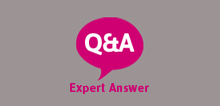Preparing for your first internship or work experience
So, you’ve secured your first internship or work experience - congratulations! But… then what? When your first day of the job starts approaching, what should you do to prepare? How can you start off on the right foot and make the most of the whole experience? We’ve teamed up with upReach, a charity that supports university students from lower socio-economic backgrounds, to hear their top tips for starting your first internship or work experience.

Why is it important to make the most of an internship or work experience?
If you’ve already got the job, you don’t need to do any more preparation, right? Well…
Consider this. Organisations hiring for graduates and entry-level roles could take a chance on new hires through a thorough recruitment process – or they could offer those roles to their interns and work experience students who have already demonstrated they’re a good fit for the organisation and proven their skills. Is it any surprise that organisations are more likely to offer graduate roles to their interns instead?
Making a good impression will therefore increase your chance of achieving your longer-term career goals. You may be fast-tracked to the last stage of an application process, or even be offered a higher-level role outright, if you show your enthusiasm and work ethic right from Day 1.
How should you prepare for the first day of a new role?
Research the company
You may have already done a lot of research throughout your application process, but could you tell someone:
- What exactly the organisation does?
- Where your role or team fits into the organisation?
- Their recent projects and events?
- What the organisation’s culture, mission and values are?
- Who the CEO is?
Top Tip: Knowing the answer to these questions will not only help you feel more confident in your role, but it’ll also give you great talking points with your new coworkers.
Make sure you know what your new workplace’s dress code is. If you aren’t sure, don’t be afraid to ask.
Dress codes might be described as:
- Casual: Clothes that are more relaxed and informal, such as jumpers, t-shirts, and jeans.
- Smart Casual / Business Casual: A more formal version of casual, which might include smarter trousers or a skirt, with a shirt or blouse.
- Business Formal: A matching suit and tie, blouses, jackets, blazers and formal dresses could be worn for Business Formal workplaces.
- Dress for your Day: Here, you might dress Business Formal if you have meetings with external clients, and dress Smart Casual if you’re in the office or working from home.
Top Tip: It’s better to overdress on the first day than underdress. Then, you can see what your coworkers generally wear and adjust accordingly.
Give yourself plenty of time to arrive punctually.
- Leave at least 20 minutes’ earlier than you need to in case of delays or issues finding the office. The earlier, the better – you’ll feel much more comfortable waiting for your start time than you would do rushing to get there.
- Ensure you know who your first point of contact is.
- If you are late or ill, call them and provide an explanation as early as possible.
How can you make the best impression during your internship or work experience?
Connect with others
‘Networking’ might seem like a daunting concept, but all it really means is getting to know people and what they do. Aim to build authentic relationships from the start, not just with your immediate team or line manager, but also the others in your office or in roles you find interesting.
- Think about what you’d like to learn from others; listen during meetings and conversations to understand different people’s roles, and use that as a conversation starter.
- Connect with people on LinkedIn. Send a personalised note with who you are and why you’re connecting with them.
- Schedule catch-ups. Introduce yourself to those you’d like to network with in-person or over email, and ask if they have time for a catch-up. The worst they can do is say no!
Demonstrate your skills, positive attitude and eagerness to learn.
- Don’t be afraid to ask lots of questions! Everyone was new at some point and had to learn – it’s much better to ask what you might think are silly questions than to not know the answers to them.
- Offer any skills you think you can contribute – are you an excellent researcher? A social media whizz? An expert in a particular coding language? Ask your manager for tasks in these areas or projects that interest you!
- Top Tip: If you’re not sure what your strengths are, take the Graduate Employability Framework and get a free report on your employability in just 10 minutes.
- See if you can shadow other employees and see what skills they use in action.
- Keep a journal or notes to track your progress, useful information, and what you’d like to continue developing.
- Ask your manager for feedback on what you could be doing better, and put their advice into practice.
Advocate for yourself
During your work experience, you should be stretching yourself – it will probably feel uncomfortable if you’ve never had work experience before. However, if you feel overwhelmed, ask for help: your manager can help you prioritise your tasks, and understand what can be dropped or completed later.
- Discuss how you work best with your manager and colleagues, such as your preferred communication methods and how you organise your time, and see if your ways of working can be adapted accordingly.
- Ask for reasonable adjustments if you need them, whether that’s because of a medical condition, neurodivergence, and/or living situations. You do not need evidence of a medical diagnosis to be able to legally ask for reasonable adjustments. These can include: software to help with reading and writing; more scheduled breaks throughout the day; or flexible working requests.
If all has gone well throughout your work experience, you might be offered a fast-track on the application process for a more advanced role. Make sure to practise what you’ll be assessed on, such as by completing a Mock Interview; students on the upReach programme can get detailed feedback on their interview answers by completing these with their Programme Coordinators, who act as their 1-to-1 career coach. Otherwise, you could also practise individually, with a university careers service, or with family or friends.
There are many reasons preparing for the first step in your career is important – and whilst getting the next career step sorted would be a great outcome, what’s most important is how you’ll feel in yourself. By making a positive impression on those around you, you’ll also feel more positive about yourself and your abilities. All that’s left to say is… best of luck, you’ll be amazing!
About upReach
upReach is a multi-award-winning charity that provides 1-to-1 career coaching to ambitious students from lower socio-economic backgrounds, helping them to discover different career options, develop their employability skills and secure work experience at top companies across the UK. To learn more about the support upReach provides, visit their website.
Next Steps
- Chat about this subject on our Discussion Boards.
By
Updated on 15-Aug-2024
Sorry, comments closed
No featured article














